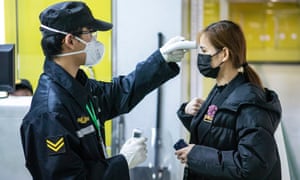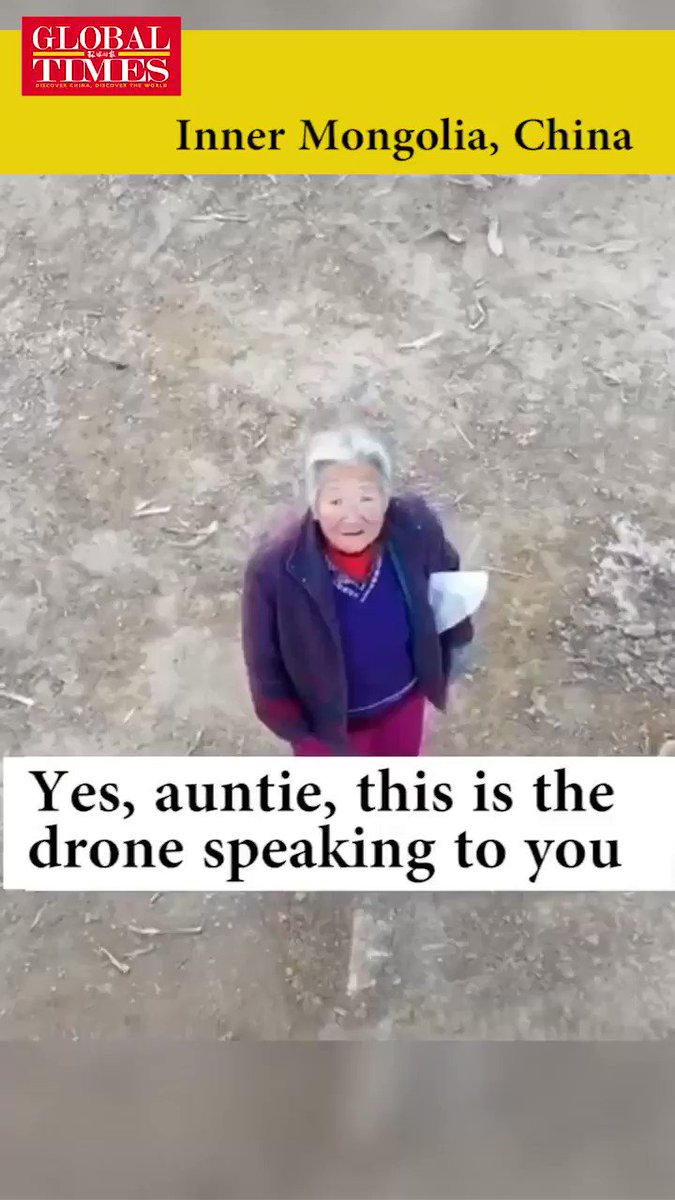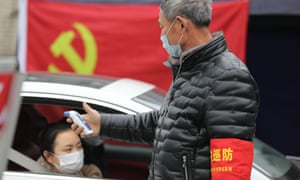Epidemic has given authorities justification for unprecedented crackdown on citizens
Aman stands next to a cart in a snow-covered field in Inner Mongolia, trying to carve a path. A drone hovers in the distance and a voice calls out: “Uncle, why are you still going out without a face mask? Don’t laugh. Hurry up and get in your car and go home.”
As the man drives away, glancing back, the drone follows him and the voice warns: “Don’t come outside if you don’t have to. Rest at home … What are you looking at? Go!”
The video, from a clip posted by China’s state-run Global Times on the ways local officials are fighting against coronavirus, is one of many examples of how China is scaling up controls and surveillance to battle the virus that has now reached every Chinese province, municipality and territory.
Chinese officials in rural areas are creatively using #drones to make sure local residents don‘t gather together without wearing masks during the nationwide battle against the #coronavirus. globaltimes.cn/content/117813…
1,107 people are talking about this
Authorities have responded to the outbreak with unprecedented measures. More than 50 million people have been placed under a lockdown and myriad directives have been issued, from enforcing temperature checks and “strengthening monitoring” of citizens’ health to persuading people not to hold weddings or other large gatherings.
Quick guide
What is the coronavirus and should we be worried?
The outbreak was first detected by authorities in December, though they did not sound the alarm until more than a month later. It has caused a rare opening in domestic media coverage for debate and criticism – some from government bodies like the supreme people’s court or the usually pro-government editor of Global Times.
But analysts say the outbreak is just as likely to justify more surveillance and invasive methods by the government. “The epidemic has given the authorities an excuse to boost control over the country,” said Willy Lam, an adjunct professor at the Chinese University of Hong Kong. “Definitely we will see more control and surveillance.”
Share your story
Share your stories
If you have been affected or have any information, we'd like to hear from you. You can get in touch by filling in the form below, anonymously if you wish or contact us via WhatsApp by clicking here or adding the contact +44(0)7867825056. Only the Guardian can see your contributions and one of our journalists may contact you to discuss further.
Share your story
Share your stories
If you have been affected or have any information, we'd like to hear from you. You can get in touch by filling in the form below, anonymously if you wish or contact us via WhatsApp by clicking here or adding the contact +44(0)7867825056. Only the Guardian can see your contributions and one of our journalists may contact you to discuss further.
Authorities have already applied top-down controls to deal with the virus, which has killed more than 300 people and infected more than 17,000. Across China, banners have sprung up telling residents what they should and should not do. They should go out as little as possible, avoid gathering with friends or family, and submit to temperature tests.
A government directive in January called on townships and villages to “strengthen efforts to keep tabs on people” by treating communities as grids and “monitoring … the people within them”, according to the blog China Law Translate.
In Beijing and other cities, neighbourhood committees go door to door asking if anyone has recently returned from Hubei province. Residents must submit to temperature checks and sign in when they enter and leave. In some compounds, they are asked to scan a QR code to log their details.
In the city of Guyuan, in the north-western province of Ningxia, authorities said on Sunday that all stores, markets, hotels and pharmacies must make sure there are no more than 25 people per 100 sq meters of space.
Observers and human rights groups say authorities are in some cases going too far. “Violating the rights of tens of millions of people in the effort to address the coronavirus outbreak will be counterproductive,” Yaqiu Wang, China researcher at Human Rights Watch, said in a statement last week. “Transparency and engaging civil society will be the far better approach.”
Observers believe some of these controls could last beyond the current crisis, fitting the current trajectory under the Chinese leader, Xi Jinping, who has ramped up the party’s control over the country while clamping down on civil society, academia and even moderate forms of dissent.
“Tighter control over individuals, press controls, using hi-tech methods to keep track of people – these kinds of things will be exacerbated after the epidemic,” Lam said.
Citizens, frustrated at government officials, appear to be emboldened by the current crisis. To get around restrictions, internet users have also created Github pages and post screenshots of censored articles or content on blocked websites.
Increasingly, some of this criticism is being aimed at Xi, who said in January that he was “personally commanding and deploying” the management of the crisis. Internet users, noting that Xi has not visited the frontline of the outbreak in Hubei, have begun to use the term as a catchphrase for hypocritical behaviour.






No comments:
Post a Comment